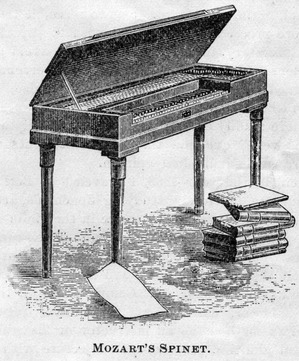From “Mozart: l’Homme et l’Artiste,” by Victor Wilder.
Mozart was not simply a composer of extraordinary fecundity; he was music itself. His entire being was absorbed in his art, and all his thoughts took naturally a melodic and rhythmic form. “You know,” he wrote to his father, “that I am, so to speak, lost to my art, and that I am immersed in music from morning till night.”
 His barber has told us what a troublesome job it was to shave him. He was no sooner seated, with the cloth round his neck, than he became lost in thought and oblivious of his surroundings. He would get up without saying a word and move from place to place, from one room to the next, while the alarmed operator followed him, razor in hand.
His barber has told us what a troublesome job it was to shave him. He was no sooner seated, with the cloth round his neck, than he became lost in thought and oblivious of his surroundings. He would get up without saying a word and move from place to place, from one room to the next, while the alarmed operator followed him, razor in hand.
The mechanical task of writing music was repugnant to him, and he gave himself up to it with regret. He traced his ideas upon chance pieces of paper, sketching a few bars as suggestions, but all the elaborating was done in his head. The most complicated and extended pieces, the vast finales of “Don Giovanni” and “Le Nozze,” were all carried in his head till they were worked out to the smallest detail. Then he began his score, writing the voice-parts and the bass, marking the entry and re-entry of the instruments, together with any other essential points, and leaving all the rest till it was necessary to put the finishing touch.
With such fecundity of spirit it is easy to imagine that he possessed in a high degree the art of improvisation. This was, indeed, one of the most astonishing and marvelous of his gifts. A chord, a note struck upon the pianoforte, opened, like a magic key, all the kingdom of harmonious enchantments and melodious wonders. If connoisseurs were about him, he remained for hours at the instrument, pouring into the ears of his auditors the most varied and ravishing ideas, and always in phrase and period, despite the rapidity of the conception, preserving the purity of outline and correctness of design which we admire in his most carefully finished works.
We have his own account of his method of composition contained in a letter to a friend:
When I am, as it were, completely myself, entirely alone, and of good cheer, say, traveling in a carriage, or walking after a good meal, or during the night, when I cannot sleep; it is on such occasions that my ideas flow best and most abundantly. Whence and how they come I know not, nor can I force them. Those ideas that please me I retain in memory, and am accustomed, as I have been told, to hum them to myself. If I continue in this way, it soon occurs to me how I may turn this or that morsel to account, so as to make a good dish of it—that is to say, agreeably to the rules of counterpoint, to the peculiarities of the various instruments, etc. All this fires my soul, and, provided I am not disturbed, my subject enlarges itself, becomes methodized and defined, and the whole, though it be long, stands almost finished and complete in my mind, so that I can survey it, like a fine picture or a beautiful statue, at a glance; nor do I hear in my imagination the parts successively, but I hear them, as it were, all at once (gleich alles zusammen). What a delight this is I cannot tell! All this inventing, this producing, takes place, as it were, in a lively dream. Still the actual hearing, the tout ensemble, is, after all, the best.
When I proceed to write down my ideas, I take out of the bag of my memory—if I may use the phrase—what has previously been collected into it, in the way I have mentioned. For this reason, the committing to paper is done quickly enough, for everything is, as I said before, already finished; and it rarely differs on paper from what it was in my imagination. At this occupation I can therefore suffer myself to be disturbed; for whatever may be going on around me, still I write, and even talk, but only of fowls and geese, or of Gretel and Bärbel, or some such matters. But why my productions take from my hand that particular form and style which makes them Mozartish, and different from the works of other composers, is probably owing to the same cause which renders my nose so-or-so large, so aquiline, or, in short, makes it Mozartish, and different from those of other people. For I do really not study or aim at any originality: I should, in fact, not be able to describe in what mine consists, though I think it quite natural that persons who have really an individual appearance of their own are also differently organized from others, both externally and internally. At least, I know that I have constituted myself neither one way nor the other.



